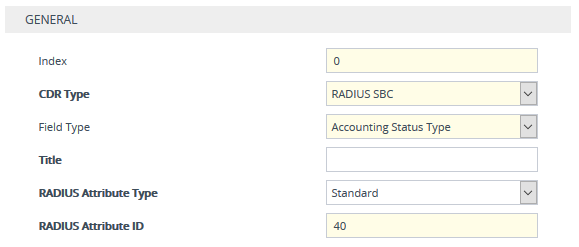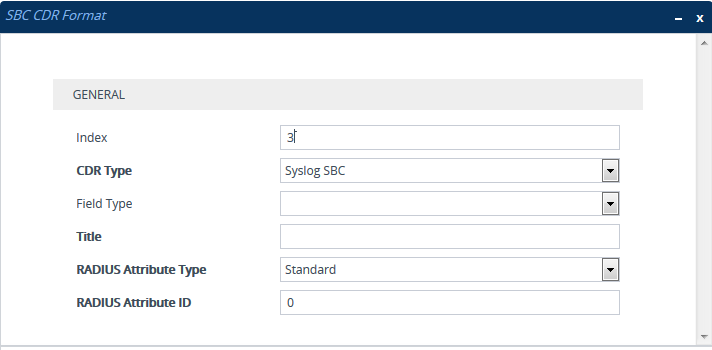|
'Index'
[SBCCDRFormat_Index]
|
Defines an index number for the new table row.
Note: Each row must be configured with a unique index.
|
|
'CDR Type'
cdr-type
[SBCCDRFormat_CDRType]
|
Defines the application type for which you want to customize CDRs.
|
■
|
[1] Syslog SBC = (Default) Customizes CDR fields for SIP signaling-related CDRs sent in Syslog messages. However, for SBC signaling "CALL_END" CDR Report Types (sent at the end of the call), you can also customize the CDR to include media-related CDR fields (e.g., Local Packet Loss). |
|
■
|
[3] Syslog Media = Customizes CDR fields for media-related CDRs sent in Syslog messages. |
|
■
|
[5] Local Storage SBC = Customizes CDR fields that are stored locally on the device. Only signaling-related CDRs are stored locally on the device. However, for SBC signaling "CALL_END" CDR Report Types (sent at the end of the call), you can also customize the CDR to include media-related CDR fields (e.g., Local Packet Loss). |
|
■
|
[7] RADIUS SBC = Customizes CDR fields (i.e., RADIUS Attributes) for CDRs sent in RADIUS accounting request messages. |
|
■
|
[11] JSON SBC = Customizes CDR fields for SIP signaling-related CDRs that are sent in JSON format to the REST server using the device's REST API. |
|
|
'Field Type'
col-type
[SBCCDRFormat_FieldType]
|
Defines the CDR field (column) that you want to customize. The applicable CDR field depends on the settings of the 'CDR Type' parameter:
|
■
|
For all types: [300] CDR Type (default); [301] Call ID; [302] Session ID; [303] Report Type; [304] Media Type; [305] Accounting Status Type; [306] H323 ID; [307] RADIUS Call ID; [308] Blank; [309] Global Session ID; [310] Leg ID |
|
■
|
Syslog SBC (signaling), Local Storage SBC, RADIUS SBC, and JSON SBC: |
[400] Endpoint Type; [401] Call Orig; [402] Source IP; [403] Destination IP; [404] Remote IP; [405] Source Port; [406] Dest Port; [407] Remote Port; [408] Call Duration; [409] Termination Side; [410] Termination Reason; [411] Setup Time; [412] Connect Time; [413] Release Time; [414] Redirect Reason; [415] Was Call Started; [416] IP Group ID; [417] IP Group Name; [418] SRD ID; [419] SRD Name; [420] SIP Interface ID; [421] Transport Type; [422] Signaling IP DiffServ; [423] Termination Reason Category; [424] Proxy Set ID; [425] IP Profile ID; [426] IP Profile Name; [427] Media Realm ID; [428] Media Realm Name; [429] SIP Termination Reason; [430] SIP Termination Description; [431] Caller Display ID; [432] Callee Display ID; [433] SIP Interface Name; [434] Call Orig RADIUS; [435] Termination Side RADIUS; [436] Termination Side Yes No; [437] Termination Reason Value; [438] Proxy Set Name; [439] Trigger; [442] Call End Sequence Number; [443] Alerting Time; [445] SIP Local Tag; [446] SIP Remote Tag; [447] Call Success; [448] Var Call User Defined 1; [449] Var Call User Defined 2; [450] Var Call User Defined 3; [451] Var Call User Defined 4; [452] Var Call User Defined 5
|
■
|
Syslog Media, RADIUS SBC, Local Storage SBC, and Syslog SBC: |
[600] Channel ID; [601] Coder Type; [602] Packet Interval; [603] Payload Type; [604] Local Input Packets; [605] Local Output Packets; [606] Local Input Octets; [607] Local Output Octets; [608] Local Packet Loss; [609] Local Round Trip Delay; [610] Local Jitter; [611] Local SSRC Sender; [612] Remote Input Packets; [613] Remote Output Packets; [614] Remote Input Octets; [615] Remote Output Octets; [616] Remote Packet Loss; [617] Remote Round Trip Delay; [618] Remote Jitter; [619] Remote SSRC Sender; [620] Local RTP IP; [621] Local RTP Port; [622] Remote RTP IP; [623] Remote RTP Port; [624] RTP IP DiffServ; [625] Local R Factor; [626] Remote R Factor; [627] Local MOS CQ; [628] Remote MOS CQ; [629] AMD Decision; [630] AMD Decision Probability; [631] Latched RTP IP; [632] Latched RTP Port; [633] Latched T38 IP; [634] Latched T38 Port; [635] Coder Transcoding
Note: For 'CDR Types' Syslog SBC,Local Storage SBC, and RADIUS SBC, the above media-related CDR fields are added only to "CALL_END" SBC signaling CDR report Types (which by default, include only signaling CDR fields).
|
■
|
Syslog SBC (signaling), Local Storage SBC, RADIUS SBC, and JSON SBC: |
[800] Source URI; [801] Destination URI; [802] Source URI Before Manipulation; [803] Destination URI Before Manipulation; [804] Redirect URI; [805] Redirect URI Before Manipulation; [806] SIP Method; [807] Direct Media; [808] Source Username; [809] Destination Username; [810] Source Username Before Manipulation; [811] Destination Username Before Manipulation; [812] Source Host; [813] Destination Host; [814] Source Host Before Manipulation; [815] Destination Host Before Manipulation; [816] Source Dial Plan Tags; [817] Destination Dial Plan Tags; [818] Remote SIP User Agent; [819] Media List; [820] Voice AI Connector ID; [821] Voice AI Connector Name; [822] Is Recorded
|
|
'Title'
title
[SBCCDRFormat_Title]
|
Defines a new name for the CDR field (for Syslog or local storage) or for the RADIUS Attribute prefix name (for RADIUS accounting) that you selected in the 'Column Type' parameter.
The valid value is a string of up to 31 characters. You can also configure the name to be enclosed by quotation marks (single or double). For example, if you want the CDR field name to appear as 'Phone Duration', you must configure the parameter to 'Phone Duration'. You can also configure the CDR field name with an equals (=) sign, for example "call-connect-time=".
Note:
|
■
|
For VSA's that do not require a prefix name, leave the parameter undefined. |
|
■
|
The parameter's value is case-sensitive. For example, if you want the CDR field name to be Phone-Duration, you must configure the parameter to "Phone-Duration" (i.e., uppercase "P" and "D"). |
|
|
'RADIUS Attribute Type'
radius-type
[SBCCDRFormat_RadiusType]
|
Defines whether the RADIUS Attribute of the CDR field is a standard or vendor-specific attribute.
|
■
|
[0] Standard = (Default) For standard RADIUS Attributes. |
|
■
|
[1] Vendor Specific = For vendor-specific RADIUS Attributes (VSA). |
Note: The parameter is applicable only to RADIUS accounting (i.e., 'CDR Type' parameter configured to RADIUS SBC).
|
|
'RADIUS Attribute ID'
radius-id
[SBCCDRFormat_RadiusID]
|
Defines an ID for the RADIUS Attribute. For VSAs, this represents the VSA ID; for standard Attributes, this represents the Attribute ID (first byte of the Attribute).
The valid value is 0 to 255 (one byte). The default is 0.
Note:
|
■
|
The parameter is applicable only to RADIUS accounting (i.e., 'CDR Type' parameter configured to RADIUS SBC). |
|
■
|
For VSA's (i.e., 'RADIUS Attribute Type' parameter configured to Vendor Specific), the parameter must be configured to any value other than 0. |
|
■
|
For standard RADIUS Attributes (i.e., 'RADIUS Attribute Type' parameter configured to Standard), the value must be a "known" RADIUS ID (per RFC for RADIUS). However, if you configure the ID to 0 (default) for any of the RADIUS Attributes (configured in the 'Column Type' parameter) listed below and then apply your rule (Click Apply), the device automatically replaces the value with the RADIUS Attribute's ID according to the RFC: |
|
✔
|
Destination Username: 30 |
|
✔
|
Accounting Status Type: 40 |
|
✔
|
Local Output Octets: 43 |
|
✔
|
Local Input Packets: 47 |
|
✔
|
Local Output Packets: 48 |
If you configure the value to 0 and the RADIUS Attribute is not any of the ones listed above, the configuration is invalid.
|


